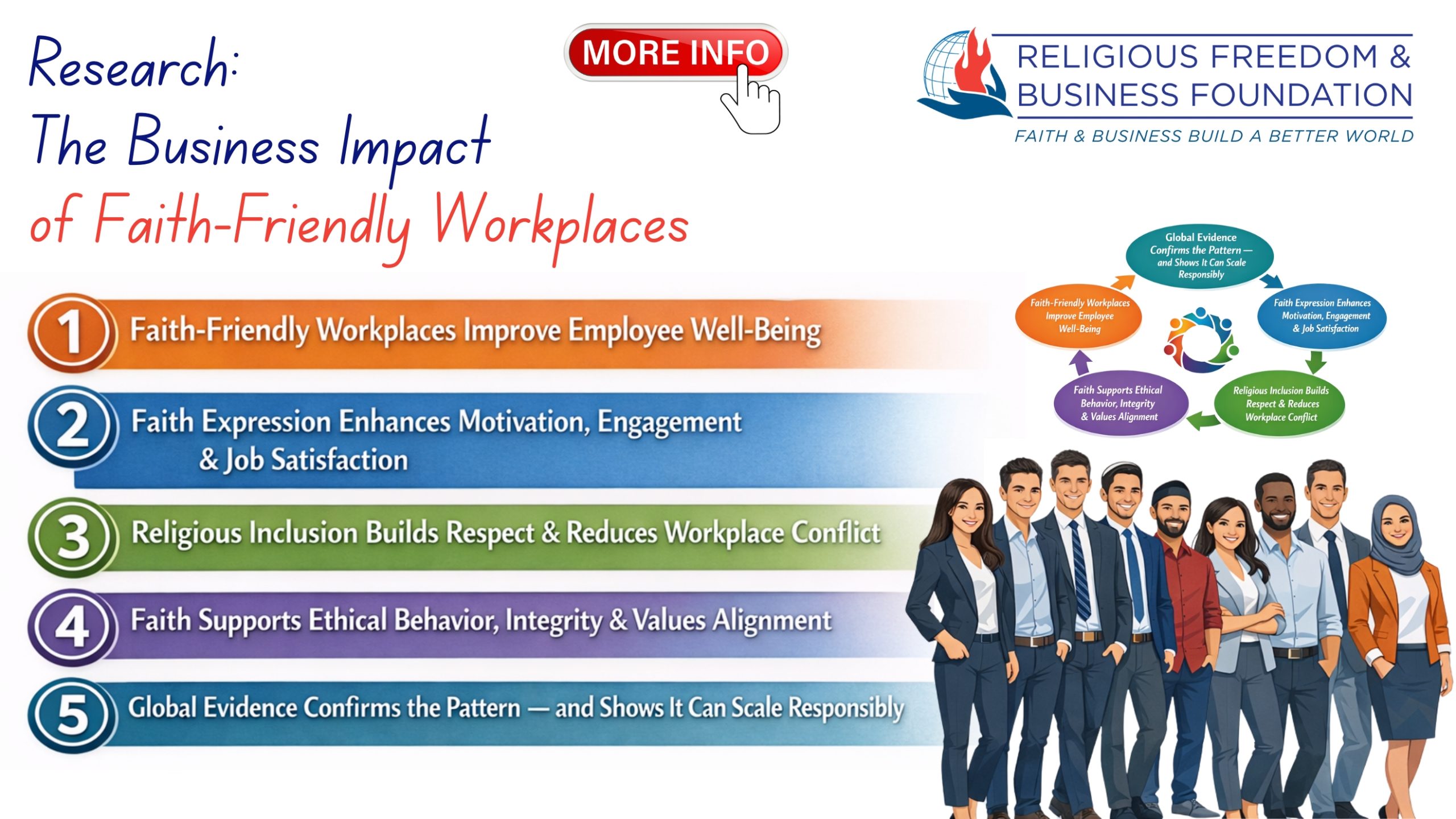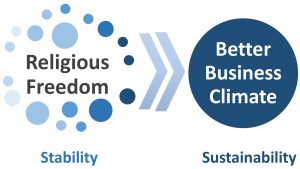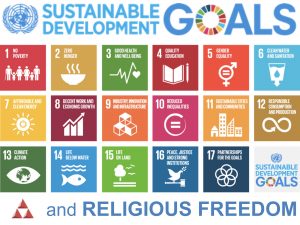Research
Religious Freedom & Business Foundation (RFBF) researchers are some of the world’s leading experts on religious diversity & inclusion in the workplace, as well as the positive socio-economic impact of freedom of religion and belief. RFBF’s founding president, Brian Grim, Ph.D. (Penn State), is a world expert in religious economies, religious demographics and religious freedom for all (including those without a religious faith). Some Key findings from our and related research are below.
Business Impact of Faith-Friendly Workplaces (details)
Religion is growing (details)
Religious economies are changing (details)
Relig. freedom drives innovation & GDP (details)
Religion helps fuel economies (details)
Workplace discrimination common (details)
Religious inclusion rising (details)
Religion & broader inclusion (details)
Faith adds resilience (details)
Other research:
The Religious Freedom & Business Foundation studies freedom of religion or belief (FoRB) and its impact on society, business and the economy. These studies and their findings are made available through various research articles and publications as well as in blogs and op-eds.
Article 18 of the Universal Declaration of Human Rights defines Freedom of Religion or Belief (FoRB) as follows: “Everyone has the right to freedom of thought, conscience and religion; this right includes freedom to change his religion or belief, and freedom, either alone or in community with others and in public or private, to manifest his religion or belief in teaching, practice, worship and observance.”
Global Study: Business is needed as an ally
Key finding: Expanding freedom of religion or belief (FORB) globally will need to rely on new directions, according to a new study conducted by the IRF Secretariat in collaboration with the Religious Freedom & Business Foundation. There is broad agreement in the potential impact of advancing religious freedom through economic initiatives within business and among business leaders. Survey respondents, in most regions around the world, also say that more active religious freedom work among businesses could lead to less youth radicalization and greater social harmony.
The Power of Business
 Companies can make significant contributions to advancing interfaith understanding and peace – religious freedom broadly defined – through both core business and outreach activities. This set of case studies from the UN Global Compact Business for Peace platform and the Religious Freedom & Business Foundation fall into four areas:
Companies can make significant contributions to advancing interfaith understanding and peace – religious freedom broadly defined – through both core business and outreach activities. This set of case studies from the UN Global Compact Business for Peace platform and the Religious Freedom & Business Foundation fall into four areas:
Using Marketing Expertise to Bridge Borders: Companies can make positive contributions to peace in society by mobilizing advertising campaigns that bring people of various faiths and backgrounds together.
Incentivizing Innovation: Because cross-cultural dialogue and cooperation is an essential part of daily work for multinational companies, some have programs that specifically recognize and mentor social enterprises that foster inter-cultural and inter-religious innovation.
Incubating and Catalyzing Social Entrepreneurship: Business can also provide common ground where religious differences give way to shared concern and enterprise. Some initiatives offer support to new entrepreneurs in conflict-affected areas, which can reduce extremism and empower marginalized communities.
Supporting Workforce Diversity: When businesses are sensitive to the religious and cultural issues around them, they can not only increase employee morale and productivity, but also address unmet difficult social needs.
Economic Growth
 As the world navigates away from years of poor economic performance, religious freedom may be an unrecognized asset to economic recovery and growth, according to this new study. The study examines and finds a positive relationship between religious freedom and ten of the twelve pillars of global competitiveness, as measured by the World Economic Forum’s Global Competitiveness Index.
As the world navigates away from years of poor economic performance, religious freedom may be an unrecognized asset to economic recovery and growth, according to this new study. The study examines and finds a positive relationship between religious freedom and ten of the twelve pillars of global competitiveness, as measured by the World Economic Forum’s Global Competitiveness Index.
The study, however, goes beyond simple correlations by empirically testing and finding the tandem effects of government restrictions on religion and social hostilities involving religion (as measured by the Pew Research Center) to be detrimental to economic growth while controlling for 23 other theoretical, economic, political, social, and demographic factors.
The new study also furthers previous work in the field, including The Price of Freedom Denied (by Brian Grim & Roger Finke, Cambridge, 2011). Grim & Finke’s research showed that religious freedom is a key ingredient to peace and stability, as measured by the absence of violent religious persecution and conflict. This is particularly important for business because where stability exists, there is more opportunity to invest and conduct normal and predictable business operations, especially in emerging and new markets.
The study’s findings are timely given the rising tide of restrictions on religious freedom documented by Pew Research, showing that 76% of the world’s people currently live with high religious restrictions or hostilities. And the findings are especially relevant because the research shows that the largest markets for potential growth are in countries where religious freedom is highly restricted – casting a question mark over the long-term sustainability of growth in countries such as China.
Economic Growth Slowed by Decline in Religious Freedom
Two billion more people live in countries with high restrictions on religious freedom than did so just a decade ago, according to an analysis by the Religious Freedom & Business Foundation (RFBF) of a Pew Research Center report. The dramatic decline in religious freedom impacts not only peace and stability but also slows global economic growth, according to RFBF. Read more.
Religious Freedom and LGBT Rights
The average level of religious freedom is 36% higher in the countries with higher levels of support for LGBT rights than in countries with low levels of support for LGBT rights. In the one-third of countries scoring the highest on support for LGBT rights, the level of religious freedom was 7.5 compared with only 5.5 in the one-third of countries scoring at the bottom of the scale on support for LGBT rights (see chart).
You will likely find the following results of the first study of its kind to be surprising. Given that extremely strong views exist on these issues, empirical data from a global perspective may point toward some common ground. Time will tell. But as the video above by RFBF Senior Corporate Advisor Kent Johnson shows, simultaneously protecting both religious and LGBT inclusion is entirely possible, as the example of Texas Instruments shows. Read more.
Religion’s Socio-Economic Value
Religion annually contributes nearly $1.2 trillion of socio-economic value to the U.S. economy, according to a September 2016 study by Brian Grim and Melissa Grim in the Interdisciplinary Journal of Research on Religion.
→ That is equivalent to being the world’s 15th largest national economy, putting it ahead of about 180 other countries.
→ It’s more than the annual revenues of the world’s top 10 tech companies, including Apple, Amazon and Google.
→ And it’s also more than 50% larger than that of the annual global revenues of America’s 6 largest oil and gas companies.
So – you might say – that represents a lot of spiritually inspired fuel being pumped into the U.S. economy.
And, most importantly, religion plays a unique role in the socio-economic behaviors of Americans.
For example, adults who are highly religious are significantly more likely than those who are less religious to report they did volunteer work and made donations to the poor in the past week, according to the Pew Research Center.
Demography & Economy
As religious diversity and religious populations grow, so does their potential impact, creating new challenges and opportunities for societies, governments and economies. Changing religion, changing economies is a “first-cut” type of research providing pioneering insights into the future religion and economic change based on best available data. While it does not offer recommendations, business, government and civil society leaders will find useful information to inform discussion for years to come.
Indeed, the growth of religious populations has implications for how the world’s wealth will be spread about.
The economic transformations of China and India are common knowledge. But, what is less well known is that the five leading economies of 2050 are projected to represent one of the most religiously diverse groupings in recent memory. For instance, today, seven of the G8 nations have Christian-majority populations. But by 2050 only one of the five leading economies is projected to have a majority Christian population – the United States. The other mega economies in 2050 are projected to include a country with a Hindu majority (India), a Muslim majority (Indonesia), and two with exceptionally high levels of religious diversity (China and Japan).
Note: This study is part of a “toolkit” developed by members of the Global Agenda Council on the Role of Faith, and we thank the members for their input. The Council seeks to increase “religious literacy” – including awareness and understanding of the positive impact of the role of faith in various sectors – in our complex world.
Business Case Studies (Templeton Religion Trust)
The Religious Freedom & Business Foundation (RFBF) studies freedom of religion & belief (FoRB) and its connection to society, business and the economy. As part of this ongoing research, RFBF has completed twelve case studies of business leaders who were finalists for the inaugural Global Business & Interfaith Peace Awards.
The case studies are made possible through a generous grant by the Templeton Religion Trust. The first case study on Don Larson and Sunshine Nuts is available to all. The remaining case studies are available to subscribers.
 The case studies fall into one or more of the following categories of action. They are grouped by their main type of action.
The case studies fall into one or more of the following categories of action. They are grouped by their main type of action.
1. Core business
Championing interfaith understanding and peace through a company’s core business operations, including internal procedures, human resources hiring practices, training, product/service development, sourcing policies, supply chains, as well as the development of products and services that promote interfaith understanding and peace.
2. Social investment and philanthropy
Financial and in-kind contributions, and strategic social investment support for NGOs, UN and/or multilateral agencies or directly to affected communities and/or contribution of functional expertise through volunteering efforts.
3. Advocacy and public policy engagement
Fostering social cohesion and inter-group dialogue and relationship-building in the workplace, marketplace and local community.
4. Partnership and collective action
Joining forces with Governments, UN entities, civil society organizations and/or other businesses to act collectively to promote interfaith understanding and peace and forge long-term partnerships for local or regional economic and sustainable development.
TEDx Talk: Religious Freedom by the Numbers
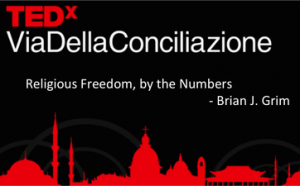 Brian Grim, founder and president of the Religious Freedom & Business Foundation, spoke at the Vatican in April 2013. He reviewed the deteriorating global situation of religious freedom based on his previous work while at the Pew Research Center.
Brian Grim, founder and president of the Religious Freedom & Business Foundation, spoke at the Vatican in April 2013. He reviewed the deteriorating global situation of religious freedom based on his previous work while at the Pew Research Center.
As cited by numerous national and international bodies, Pew Research shows a dangerous global trend of increasing religious restrictions and hostilities, despite the vast majority of people adhering to a religion. Today, more 75% of people live with high religious restrictions. These religious restrictions and hostilities adversely impact businesses in every region of the globe. Religion-related hostilities in the Middle East, South Asia, Russia and China disrupt markets and production. Religious prejudices stigmatize women and keep them out of the marketplace in counties as diverse as Turkey and France. And fears of offending religious or cultural norms – including secular norms – impede innovation and stifle entrepreneurial spirit in the West and the rest of the world.
Grim led the Pew Research study on global restrictions on religion from 2006 until he left to become president of the Religious Freedom & Business Foundation on Feb. 1, 2014.
The State of Religious Freedom in the World
The deadly anti-Semitic and racist demonstrations in the Virginia city of Charlottesville over the weekend are further evidence of high social hostilities involving religion in the United States.
Religious hostilities in the U.S. are high, according to the Pew Research Center’s past two annual reports (see line chart). The events in Charlottesville follow on from last weekend’s bombing of a Minnesota mosque.
Research show that religion-related hostilities negatively impact the economy. On sign of this is that the chief executive of Merck, one of the world’s largest pharmaceutical companies, resigned on Monday from President Trump’s American Manufacturing Council. “America’s leaders must honor our fundamental values by clearly rejecting expressions of hatred, bigotry and group supremacy,” said Merck & Co Inc CEO Kenneth Frazier.
The religious hostilities in the U.S. are part of a long-term global trend of increasing religious restrictions and hostilities. Indeed, a new analysis of the same Pew data show that the number of people living in countries with high religious restrictions and hostilities has reached nearly six billion people, or 78.5% of the world’s total population in 2017. This represents an increase of 1.1 billion since the first year of the study (see bar chart).*
Socioeconomic Impact
Social dynamics are complex and causal mechanism are multifaceted, and religious freedom is not a silver bullet or secret solution to the world’s ills. Nevertheless, the role of religious freedom – and its manifestations in interfaith and intercultural understanding and cooperation – are often overlooked contributors to positive socio-economic outcomes and sustainable development.
So, what might be the impact of freedom of religion or belief (FoRB) on society, business and the economy?
This summary of research indicates that religious freedom contributes to human flourishing and sustainable development – and their underlying socioeconomic foundations – in at least seven ways: (1) Fosters respect for differing faiths and beliefs, including people with no particular faith; (2) Helps to reduce corruption by allowing faith-based ethics to be voiced; (3) Engenders peace by defusing religious tensions thereby reducing religion-related violence and conflict; (4) Encourages broader freedoms; (5) Develops the economy as religious groups play a measurable role in the human and social development of countries; (6) Overcomes the over-regulation associated with such things as coercive blasphemy laws; and (7) Multiplies trust among employees whose faith and beliefs are respected.
The Price of Freedom Denied
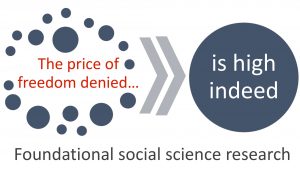 Denials of religious freedom are associated with poorer economic performance and lower global competitiveness, according to a study by researchers at Georgetown University and Brigham Young University. The study looked at GDP growth for 173 countries in 2011 and controlled for two-dozen different financial, social, and regulatory influences.
Denials of religious freedom are associated with poorer economic performance and lower global competitiveness, according to a study by researchers at Georgetown University and Brigham Young University. The study looked at GDP growth for 173 countries in 2011 and controlled for two-dozen different financial, social, and regulatory influences.
The new study also furthers previous work in the field, including The Price of Freedom Denied (by Brian Grim & Roger Finke, Cambridge, 2011). Grim & Finke’s research showed that religious freedom is a key ingredient to peace and stability, as measured by the absence of violent religious persecution and conflict.
This is particularly important for business because where stability exists, there is more opportunity to invest and conduct normal and predictable business operations, especially in emerging and new markets.
The empirical basis for the socio-economic benefits of religious freedom is also found in three publications (linked here) that look at the price of freedom denied. Also see the research white paper on the corporate social responsibility of religious freedom. Read reviews of The Price of Freedom Denied.
Sustainable Development
In this ongoing series, the relationship is explored between religious freedom and the 17 Sustainable Development Goals (SDGs) adopted by world leaders in September 2015 at an historic UN Summit.
This relationship is important to understand because over the next fifteen years, motivated by these new goals, countries will mobilize efforts to end all forms of poverty, fight inequalities and tackle climate change, while ensuring that no one is left behind. All sectors of society need to see how religious freedom contributes to these efforts.
Sustainable development has been defined as development that meets the needs of the present without compromising the ability of future generations to meet their own needs. It calls for concerted efforts towards building an inclusive, sustainable and resilient future for people and planet. And eradicating poverty in all its forms and dimensions is an indispensable requirement for sustainable development.
This series examines how religious freedom plays a part in achieving sustainable, inclusive and equitable economic growth, creating greater opportunities for all, reducing inequalities, raising basic standards of living, fostering equitable social development and inclusion, and promoting integrated and sustainable management of natural resources and ecosystems.
Research White Paper
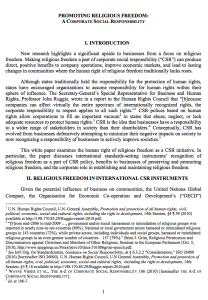 PROMOTING RELIGIOUS FREEDOM: A CORPORATE SOCIAL RESPONSIBILITY
PROMOTING RELIGIOUS FREEDOM: A CORPORATE SOCIAL RESPONSIBILITY
New research highlights a significant upside to businesses from a focus on religious freedom. Making religious freedom a part of corporate social responsibility (“CSR”) can produce direct, positive benefits to company operations, improve economic markets, and lead to lasting changes in communities where the human right of religious freedom traditionally lacks roots.
Although states traditionally held the responsibility for the protection of human rights, states have encouraged organizations to assume responsibility for human rights within their sphere of influence. The Secretary-General’s Special Representative for Business and Human Rights, Professor John Ruggie, wrote in a report to the Human Rights Council that “[b]ecause companies can affect virtually the entire spectrum of internationally recognized rights, the corporate responsibility to respect applies to all such rights.” CSR polices based on human rights allow corporations to fill an important vacuum in states that abuse, neglect, or lack adequate resources to protect human rights.
CSR is the idea that businesses have a responsibility to a wider range of stakeholders in society than their shareholders. Conceptually, CSR has evolved from businesses defensively attempting to minimize their negative impacts on society to now recognizing a responsibility of businesses to actively improve societies.
This white paper examines the human right of religious freedom as a CSR initiative. In particular, the paper discusses international standards-setting instruments’ recognition of religious freedom as a part of CSR policy, benefits to businesses of preserving and promoting religious freedom, and the corporate role in establishing and maintaining religious freedom.
World Economic Forum
 Global Agenda Council, Role of Faith
Global Agenda Council, Role of Faith
Established in 2008, the Network of Global Agenda Councils is an invitation-only knowledge network that serves as an international brain trust to the World Economic Forum and the world at large. Members of the 2014-2016 Global Agenda Council on the Role of Faith comprise the world’s foremost experts to provide thought leadership that furthers the faith agenda within World Economic Forum’s activities. During the 2014-16 term, the Council was chaired by Chris Seiple, President Emeritus, Institute for Global Engagement, and a Board Member of the Religious Freedom & Business Foundation, and Brian Grim, President, Religious Freedom & Business Foundation. Liu Peng, Founder and Director, Beijing Pu-Shi Institute for Social Sciences, served as vice chair.
From climate change to gender parity, the World Economic Forum has identified 10 key global challenges that require collaboration across different sectors to crack.
The research and articles here are part of a “toolkit” developed by members of the Council, which seeks to increase “religious literacy” – including awareness and understanding of the positive impact of the role of faith in various sectors – in our complex world. Featured articles include “The Role of Faith in Addressing Key Global Challenges”; “Can religion make economic growth more fair?”; “Religion holds women back. Or does it?”; “4 reasons why climate change can’t be solved without religion”; “Faith, the internet and improving the state of the world”; and “How the Pope’s climate message went viral.”
This ongoing series examines issues in European law related to freedom of religion or belief in the workplace.
(1) Religious freedom standards in the European workplace
by Ahrens G. Kerwood
(2) Recommendations and Review of the Corporate Pledge in Light of European Law
by Ryan Anderson
(3) Is freedom of religion or belief in the workplace really protected by the European Court of Human Rights?
by Rebeca Vázquez Gómez

